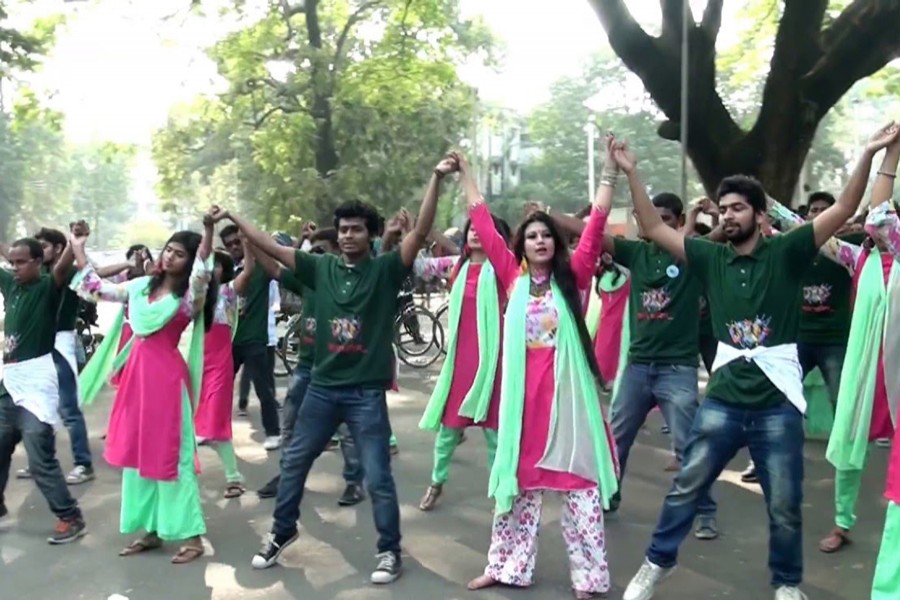At some points of life, it becomes difficult to differentiate between tears of joy and sadness. One such moment is the time when students complete their academic life and prepare for leaving their alma mater. It is not for nothing that a passing out batch sets aside a day for abandon indulgence in a celebration of colour called rag day. This is an occasion for releasing the pent-up emotion and stress to which they are subjected throughout the year.
Those who have not gone through the process would not appreciate the exuberance which in fact is the other side of the sadness enveloping the minds as they know their time is up and will have to say good bye to friends and classmates, the classrooms, laboratories, libraries, canteen and even the patches of green pasture where they spent leisure hours. They are invaded by nostalgia in advance. It is because of the conflicting emotions -one for bidding adieu to a regulated life and the other for uprooting the nice and subtle networks spread all across the campus -that overwhelm them.
Students standing a step away from graduating today are fortunate to have the opportunity of bringing out the rag-day rally. To etch out their impression of each other, they take home a souvenir in the form of a T-shirt or shirt written all over by class mates or even teachers. How sorely the older generation missed it. In the early days of Bangladesh, rag days or convocations were unimaginable. It was the time when few students could afford more than two shirts or pants. In 1973 or 74, crisis of quality clothes moved the Dhaka University authorities to distribute shirt or pant pieces - not both -- among students so that they could at least dress modestly. The famine of 1974 compelled students of that time to forego a rice meal at night. Handmade roti comprised the dinner and still students distributed a portion of their ration among people who could not manage food.
Anyone coming through such an experience then will feel how blessed today's would-be university graduates are! Today the relations between students of the opposite sexes are quite normal. They address each other 'tui' and if anyone hesitates to do so, s/he is considered an odd person out. So they take the liberty of praising each other highlighting their plus points and in rare cases caricaturing their weaknesses, if any. Here is an example of how they do so.
'Discollegiate student of CSE 15B … Damn care! Stay like this. Don't take life seriously. Enjoy dude!' This is how a girl student inscribes on the white T-shirt of her fellow batch mate, a male student on the rag day.
'Dear, .....(institution) will never understand how genius you were and what they have missed. I will miss you a lot. Stay fine,' scribbles another.
'Genius brother, there is none who can defeat you in chess', writes yet another.
'You are so so talented! Waiting for your awesome game idea', another classmate exults.
'Simply genius', thinks yet another.
Then a teacher advises,
'Leave game, build career.'
Accolades have poured in like rains from all corners but not without some hints of sarcasm in a case or two. These are only a few of the many such genuine exploits by a student who has not done well in terms of academic performance. His callous and casual approach to study has let him down but at times his brilliance shone. He emerged champions in chess -both in hall competition and the entire science and technology institute's competition -as well as Sudoku. The praises were showered because of the awesome performance he put up at the end of the last semester. Previously also he had to his credit the championship performance.
Now why does so talented a student perform poorly in class or semester exams? In geniuses there is something called contrast -both positive and negative juxtaposed against each other. Somehow the negatives predominate when the hard and fast rules of the system are not to the liking of such talented individuals. They cause their own bleeding without becoming aware of it.
When teachers and parents are more concerned about results at the end of the academic years, there are such students who see life in a different light. With extra gift of talents they simply do not know how to apply those to their own personal benefits. To parents and near and dear ones, they are a misfit. But the potential is there and with luck some of them can come up with creativity or innovation unmatched by academic results.
From a vantage point of life, someone materially successful will not approve of this waywardness. On the occasion of Rag Day, however, any such contemplation is left aside and all indulge in the euphoria.


